Old Browser
Looks like you're visiting us from {countryName}.
Would you like to stay on the current country site or be switched to your country?



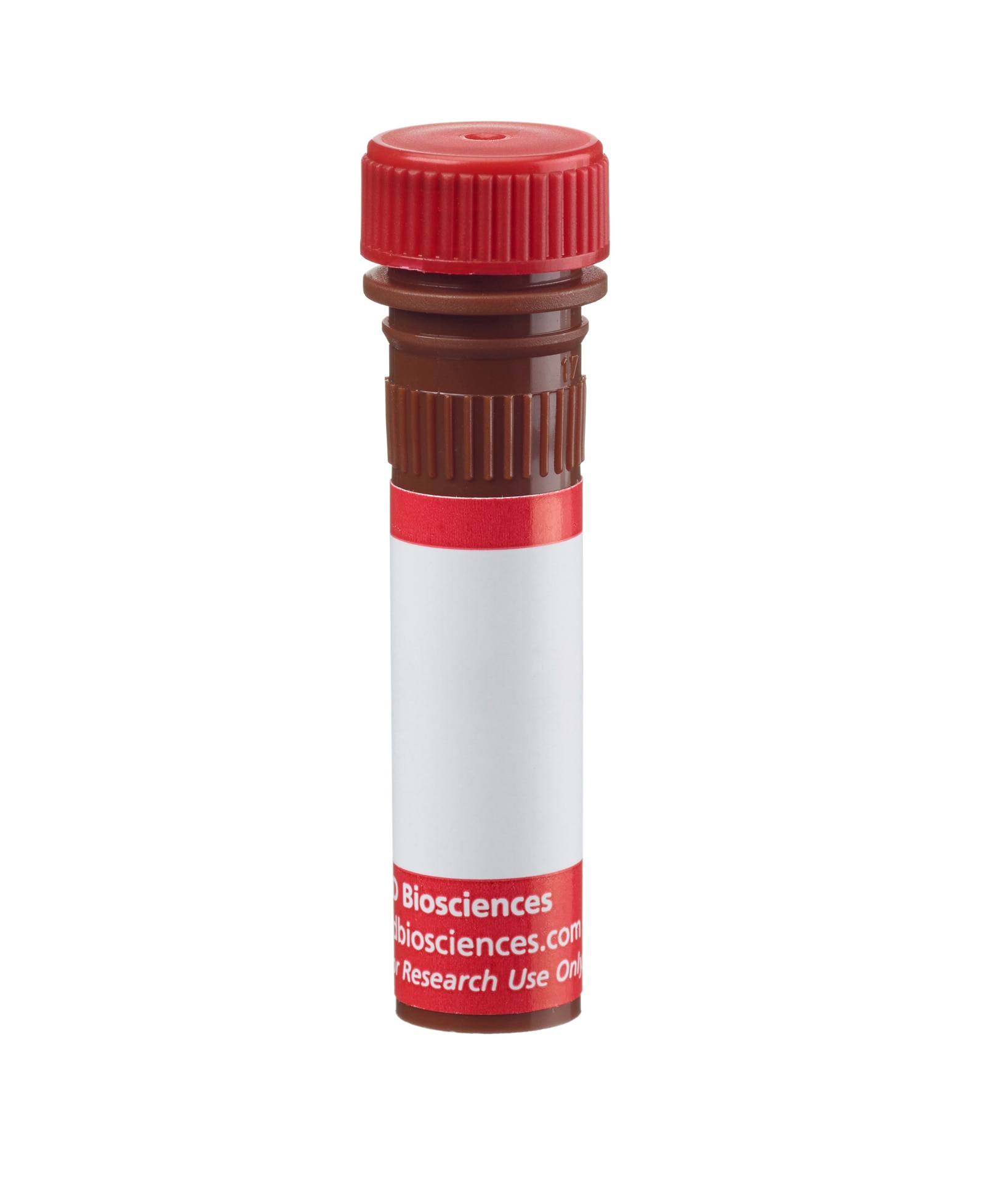

Analysis of CrkL (pY207) in human chronic myelogenous leukemia cell line and BCR-ABL expressing cells. K562 cells (ATCC CCL-243) were either treated with the tyrosine kinase inhibitor, imatinib, at 25 μM (LC Laboratories, shaded histogram) for 2 hours at 37°C or untreated (open histogram, left figure). The cells were fixed (BD Cytofix™ buffer, Cat. No. 554655) for 10 minutes at 37°C, then permeabilized (BD Phosflow™ Perm Buffer III, Cat. No. 558050) on ice for at least 30 minutes, and then stained with Alexa Fluor® 647 Mouse anti-CrkL (pY207, Cat. No. 560790). Flow cytometry was performed on a BD FACSCanto™ II flow cytometry system. The specificity of mAb K30-391.50.80 was confirmed by western blot (middle panel) using unconjugated antibody on lysates from control (lane 1) and imatinib-treated (lane 2) K562 cells (middle figure). CrkL (pY207) is identified as a band of 39 kDa that has decreased intensity in the treated cells. A BCR-ABL expressing human bone marrow sample (top profile) and normal human whole blood were lysed and fixed (BD Phosflow™ Lyse/Fix Buffer, Cat. No. 558049) for 10-15 minutes at 37°C and then permeabilized (BD Phosflow™ Perm Buffer III) on ice for at least 30 minutes (right figure). The cells were stained with PE Mouse Anti-Human CD34 (Cat. No. 550761), PerCP Mouse Anti-Human CD3 (Cat. No. 347344), and Alexa Fluor® 647 Mouse anti-CrkL (pY207). In each profile, the filled histogram represents CD3-positive cells and the open histogram represents CD34-positive cells. Flow cytometry was performed on a BD FACSCalibur™ flow cytometry system.



BD™ Phosflow Alexa Fluor® 647 Mouse anti-CrkL (pY207)

BD™ Phosflow Alexa Fluor® 647 Mouse anti-CrkL (pY207)

Regulatory Status Legend
Any use of products other than the permitted use without the express written authorization of Becton, Dickinson and Company is strictly prohibited.
Preparation And Storage
Recommended Assay Procedures
This antibody conjugate is suitable for intracellular staining of human whole blood, peripheral blood mononuclear cells (PBMC), and bone marrow (using BD Phosflow™ Lyse/Fix Buffer and Perm Buffer III or IV) and cell lines (using BD Cytofix™ Fixation Buffer and BD Phosflow™ Perm Buffer III or IV).
Product Notices
- This reagent has been pre-diluted for use at the recommended Volume per Test. We typically use 1 × 10^6 cells in a 100-µl experimental sample (a test).
- Source of all serum proteins is from USDA inspected abattoirs located in the United States.
- Caution: Sodium azide yields highly toxic hydrazoic acid under acidic conditions. Dilute azide compounds in running water before discarding to avoid accumulation of potentially explosive deposits in plumbing.
- For fluorochrome spectra and suitable instrument settings, please refer to our Multicolor Flow Cytometry web page at www.bdbiosciences.com/colors.
- Alexa Fluor® 647 fluorochrome emission is collected at the same instrument settings as for allophycocyanin (APC).
- The Alexa Fluor®, Pacific Blue™, and Cascade Blue® dye antibody conjugates in this product are sold under license from Molecular Probes, Inc. for research use only, excluding use in combination with microarrays, or as analyte specific reagents. The Alexa Fluor® dyes (except for Alexa Fluor® 430), Pacific Blue™ dye, and Cascade Blue® dye are covered by pending and issued patents.
- Alexa Fluor® is a registered trademark of Molecular Probes, Inc., Eugene, OR.
- Please refer to www.bdbiosciences.com/us/s/resources for technical protocols.
Companion Products


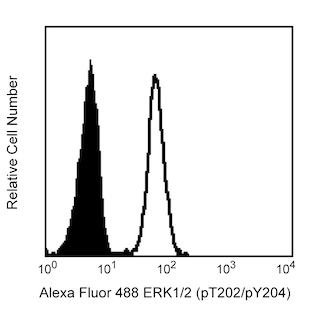
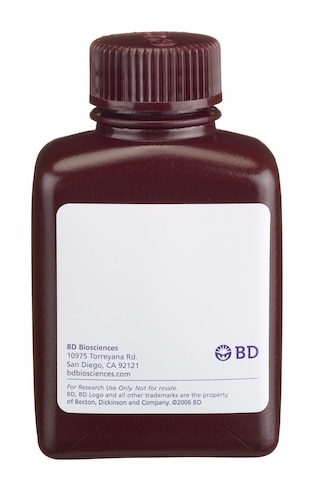
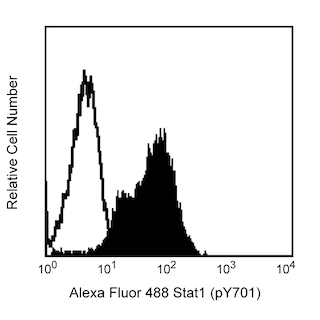
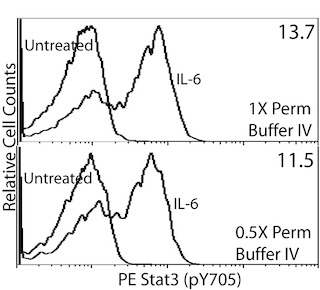
Crk-Like (CrkL) is an adaptor protein that is preferentially expressed in hematopoietic cells and is encoded by a gene that is homologous to the viral oncogene v-crk (chicken tumor virus no. 10 regulator of kinase). Its SH2 and SH3 domains bind to a variety of effector proteins, such as paxillin, p130Cas, c-Cbl, c-Abl, and C3G. These interactions are involved in the regulation of cellular migration, adhesion, and transformation. Tyrosine 207 (Y207) of CrkL is phosphorylated in hematopoietic cells that express the BCR-ABL fusion protein. This site may be a negative regulator of protein complex formation and biological activity.
The K30-391.50.80 monoclonal antibody recognizes the phosphorylated Y207 of human CrkL.
Development References (3)
-
Arai A, Nosaka Y, Kohsaka H, Miyasaka N, Miura O. CrkL activates integrin-mediated hematopoietic cell adhesion through the guanine nucleotide exchange factor C3G. Blood. 1999; 93(11):3713-3722. (Biology). View Reference
-
Feller SM. Crk family adaptors-signalling complex formation and biological roles. Oncogene. 2001; 20:6348-6371. (Biology). View Reference
-
Senechal K, Heaney C, Druker B, Sawyers CL. Structural requirements for function of the Crkl adapter protein in fibroblasts and hematopoietic cells. Mol Cell Biol. 1998; 18(9):5082-5090. (Biology). View Reference
Please refer to Support Documents for Quality Certificates
Global - Refer to manufacturer's instructions for use and related User Manuals and Technical data sheets before using this products as described
Comparisons, where applicable, are made against older BD Technology, manual methods or are general performance claims. Comparisons are not made against non-BD technologies, unless otherwise noted.
For Research Use Only. Not for use in diagnostic or therapeutic procedures.
Report a Site Issue
This form is intended to help us improve our website experience. For other support, please visit our Contact Us page.